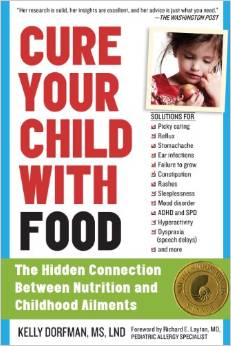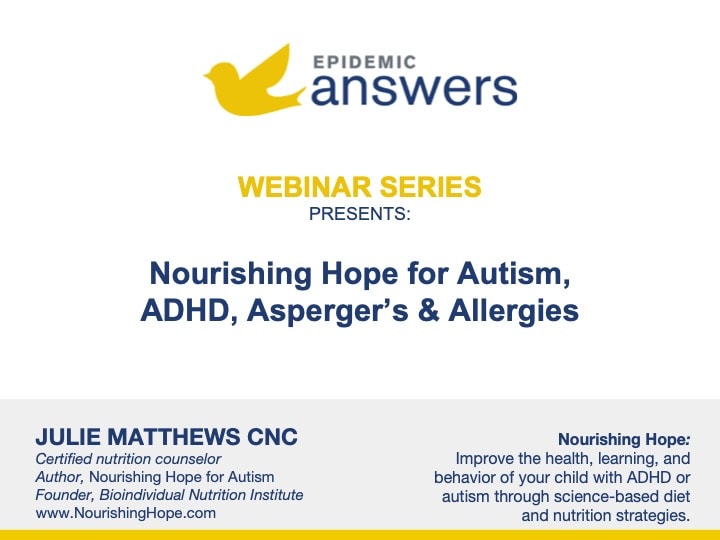In this blog post, Kelly Dorfman, MS, LND, answers frequently asked questions that parents have when exploring the gluten-free casein-free diet for their child.
Mutant Protein
Many parents of severely developmentally delayed children may be aware of a research study that was done in Norway a while back. It found that a high percentage of children with autism had a “mutant” protein in their urine that was created by the consumption of gluten (found in wheat, oats, barley and rye grains) and/or casein (milk protein) containing foods.
This “mutant” protein was the gluten and casein protein bound to a morphine-like substance. The researchers theorized this was what was causing the children to become spacey and addicted to these foods. When one or both of these protein groups was removed from the diet, many of the children reportedly became more interactive.
The technical details of how to institute this diet can be found here. The purpose of this article is to answer the most commonly asked questions about the gluten-free casein-free diet.
Who May Benefit From This Diet?
I have found that a child with a severely self-restricted diet containing mostly gluten- and/or milk-based foods is the perfect candidate for this diet.
How Long Do We Have to Stay on the Diet?
The original researchers recommended one year to be certain before re-evaluating, but I recommend a minimum of two to three months. If improvement is noticed, obviously, the diet should be continued indefinitely. The longer you can test out the diet, the better.
How Do We Know If There Is Improvement?
Measuring improvement is difficult. When the diet works, it increases a child’s ability to benefit from other therapies. This leads many parents to believe that the other therapies (speech, occupational therapy, etc.) are finally working. In the best-case scenario, the child appears suddenly to be “outgrowing” the delays or simply is more energetic and happy. Often secondary physical issues such as stomachaches or bowel symptoms ease.
What If My Child Stops Eating?
If your child has severely self-restricted his diet to gluten- and/or milk-based foods, he may go on a hunger strike for a few days. To minimize problems with the gluten-free casein-free diet, start eliminating milk products first, and then, after a week or so, work on gluten. A vast majority of children begin to eat other foods once the addictive foods are eliminated. Many underweight children even gain weight.
In rare cases, children continue to avoid eating. In every case of this that I have followed, this failure to eat was due to severe oral motor defensiveness and low muscle tone in the face and mouth. Instituting the diet brought these serious issues to light. Speech and eating generally improved simultaneously as speech or occupational therapy focused on oral-motor issues.
If My Child Improves on This Diet, What Does That Mean?
Nobody knows why people form “mutant” proteins in response to eating wheat and dairy products. The formation of mutant proteins is just one of many unusual allergy, inflammation or unknown responses that more and more people are having to an increasingly polluted and toxic environment.
One theory is that children with autism who appear normal at birth are actually born with an unknown susceptibility to developmental delays related to compromised immune functioning or an inability to efficiently breakdown everyday toxins.
This first theory appears as repeated illness or occasionally as lack of illness. Medications used to treat the sickness further contribute to immune confusion and dysregulation. Because the immune system is compromised, it uses huge amounts of the body’s resources to deal with the emergency, which it views as an immediate threat to survival. This leaves less energy for cognitive functioning and achieving major developmental milestones.
If No Improvement Is Seen, What Do I Do?
Consider staying on the diet longer. You could also explore other dietary interventions such as an elimination diet, the Feingold diet, the low-glutamate diet or a gut-healing diet. You could seek professional advice from adjunct therapists such as an occupational therapist, an oral motor therapist or a developmental optometrist.
About Kelly Dorfman MS LND
Kelly Dorfman is one of the world’s foremost experts on using nutrition therapeutically to improve brain function, energy and mood. Kelly’s special talent for integrating information from many sources and finding practical solutions has made her a popular speaker and workshop leader. She lectures extensively and is a member of Platform (formerly the National Speakers Association) and has been featured on numerous television programs including CNN’s American Morning.
Kelly’s award winning book, Cure Your Child With Food: The Hidden Connection Between Nutrition and Childhood Ailments (formerly known as What’s Eating Your Child) was given rave reviews by Publishers Weekly and the Washington Post.

As a go-to expert on nutrition issues, Kelly is frequently interviewed and quoted in the media. She has been featured in articles in The Wall Street Journal, Parade, Bethesda magazine, Living Without magazine, and the Huffington Post.
Kelly holds a master’s degree in nutrition/biology and is a licensed nutrition dietitian. She is a co-founder of Developmental Delay Resources, which has merged with Epidemic Answers. You can find out more about Kelly and her practice at kellydorfman.com
Still Looking for Answers?
Visit the Epidemic Answers Practitioner Directory to find a practitioner near you.
Join us inside our online membership community for parents, Healing Together, where you’ll find even more healing resources, expert guidance, and a community to support you every step of your child’s healing journey.
Sources & References
Adams, J.B., et al. Comprehensive Nutritional and Dietary Intervention for Autism Spectrum Disorder-A Randomized, Controlled 12-Month Trial. Nutrients. 2018 Mar 17;10(3).
Cekici, H., et al. Current Nutritional Approaches in Managing Autism Spectrum Disorder: A Review. Nutr. Neurosci. 2019;22:145–155.
El-Rashidy, O., et al. Ketogenic Diet versus Gluten Free Casein Free Diet in Autistic Children: A Case-Control Study. Metab. Brain Dis. 2017;32:1935–1941.
Epstein, S.S. Unlabeled milk from cows treated with biosynthetic growth hormones: a case of regulatory abdication. Int J Health Serv. 1996;26(1):173-85.
Ghalichi, F., et al. Effect of Gluten Free Diet on Gastrointestinal and Behavioral Indices for Children with Autism Spectrum Disorders: A Randomized Clinical Trial. World J. Pediatr. 2016;12:436–442.
Hadjivassiliou, M., et al. Gluten sensitivity: from gut to brain. Lancet Neurol. 2010 Mar;9(3):318-30.
Hartman, R.E., et al. Dietary Approaches to the Management of Autism Spectrum Disorders. Adv. Neurobiol. 2020;24:547–571.
Herbert, M.R., et al. Autism and Dietary Therapy: Case Report and Review of the Literature. J. Child. Neurol. 2013;28:975–982.
Hsu, C.-L., et al. The Effects of a Gluten and Casein-Free Diet in Children with Autism: A Case Report. Chang Gung Med. J. 2009;32:459–465.
Julian, T., et al. Gluten sensitivity and epilepsy: a systematic review. J Neurol. 2018 Aug 23.
Juntti, H., et al. Cow’s milk allergy is associated with recurrent otitis media during childhood. Acta Otolaryngol. 1999;119:867–873.
Karakula-Juchnowicz, H., et al. The Food-Specific Serum IgG Reactivity in Major Depressive Disorder Patients, Irritable Bowel Syndrome Patients and Healthy Controls. Nutrients. 2018 Apr 28;10(5). pii: E548.
Karakula-Juchnowicz, H., et al. The role of IgG hypersensitivity in the pathogenesis and therapy of depressive disorders. Nutr Neurosci. 2017 Feb;20(2):110-118.
Knivsberg, A.M., et al. A Randomised, Controlled Study of Dietary Intervention in Autistic Syndromes. Nutr. Neurosci. 2002;5:251–261.
Lee, R.W.Y., et al. A Modified Ketogenic Gluten-Free Diet with MCT Improves Behavior in Children with Autism Spectrum Disorder. Physiol. Behav. 2018;188:205–211.
Lionetti, E., et al. Gluten Psychosis: Confirmation of a New Clinical Entity. Nutrients. 2015 Jul 8;7(7):5532-9.
Marí-Bauset, S., et al. Nutritional Impact of a Gluten-Free Casein-Free Diet in Children with Autism Spectrum Disorder. J. Autism Dev. Disord. 2016;46:673–684.
Martin, V.T., et al. Diet and Headache: Part 1. Headache. 2016 Oct;56(9):1543-1552.
Matthews, J.S., et al. Ratings of the Effectiveness of 13 Therapeutic Diets for Autism Spectrum Disorder: Results of a National Survey. J Pers Med. 2023 Sep 29;13(10):1448.
Nsouli, T.M., et al. The role of food allergy in serious otitis media. Ann Allergy. 1994 Sep; 66:91.
Pelsser, L.M., et al. Effects of a restricted elimination diet on the behaviour of children with attention-deficit hyperactivity disorder (INCA study): a randomised controlled trial. Lancet. 2011 Feb 5;377(9764):494-503.
Piwowarczyk, A., et al. Gluten-Free Diet in Children with Autism Spectrum Disorders: A Randomized, Controlled, Single-Blinded Trial. J. Autism Dev. Disord. 2020;50:482–490.
Quan, L., et al. A Systematic Review and Meta-Analysis of the Benefits of a Gluten-Free Diet and/or Casein-Free Diet for Children with Autism Spectrum Disorder. Nutr. Rev. 2022;80:1237–1246.
Ramakrishnan, J.B.. The role of food allergy in otolaryngology disorders. Curr Opin Otolaryngol Head Neck Surg. 2010;18:195–199.
Rizwan, M.Z., et al. Dietary wheat gluten induces astro- and microgliosis in the hypothalamus of male mice. J Neuroendocrinol. 2023 Jul 17;e13326.
Shakoor, Z., et al. Prevalence of IgG-mediated food intolerance among patients with allergic symptoms. Ann Saudi Med. 2016 Nov-Dec;36(6):386-390.
Sloper, K.S., et al. Children with atopic eczema. II: Immunological findings associated with dietary manipulations. Q J Med. 1991 Aug;80(292):695-705.
Stockton, S., et al. The Impact of a Food Elimination Diet on Collegiate Athletes’ 300-meter Run Time and Concentration. Glob Adv Health Med. 2014 Nov;3(6):25-40.
Verena, L., et al. Elimination diets’ efficacy and mechanisms in attention deficit hyperactivity disorder and autism spectrum disorder. Eur Child Adolesc Psychiatry. 2017; 26(9): 1067–1079.
Virdee, K., et al. Food-specific IgG Antibody-guided Elimination Diets Followed by Resolution of Asthma Symptoms and Reduction in Pharmacological Interventions in Two Patients: A Case Report. Glob Adv Health Med. 2015 Jan;4(1):62-6.
Xie, Y., et al. Effects of Diet Based on IgG Elimination Combined with Probiotics on Migraine Plus Irritable Bowel Syndrome. Pain Res Manag. 2019 Aug 21;2019:7890461.
Yu, Y., et al. Efficacy and Safety of Diet Therapies in Children With Autism Spectrum Disorder: A Systematic Literature Review and Meta-Analysis. Front. Neurol. 2022;13:844117.




